Stephen Roney's Blog, page 13
May 10, 2025
Bitter Truths about Canada's Folly
Pope Anonymous
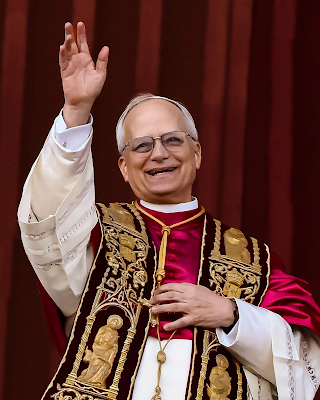
The subhead to this blog is “Catholic comments on the passing parade.” So regular readers have a right to expect some comment on the recent election of Pope Leo XIV.
Yet my unbending principle here is that I will never write unless I have something to contribute: unless I can say something no one else is saying. Otherwise it is just about me.
I have no special insight regarding Pope Leo XIV. I see only what others see. The indications are mixed. As Cardinal Prevost, and Bishop Prevost, he has not been outspoken on many issues.
Perhaps this means he will be measured and moderate as pope; a change from Pope Francis.
He has recently rebuked US VP Vance on the latter’s interpretation of the ordo amoris. On that, I think Leo, and Francis, are right. Agape, caritas, cannot play favourites. We owe no greater love to our family than to the stranger. We have a greater responsibility to family, or to country, because we owe them a debt, or have voluntarily taken on responsibility for them; but no greater love. We owe hospitality to the stranger in need. How this translates into practical policy on immigration may be subject to honest debate.
But I digress.
Even those who know what he has written, and his stance on the issues, do not necessarily know what Leo will be like as pope. Heretofore, he has been obliged to work with the team, under a vow of obedience. Now the final call is up to him.
This has produced surprises in the past. Leo XIII was elected as the modernist candidate in that conclave. He turned out to be the great opponent of the modernist heresy. Pius IX was elected as the liberal candidate, but turned out to be quite conservative. John XXIII was elected as a traditionalist, but convoked Vatican II.
So I do not know. We do not know. The spirit leads.
All I can say is that I have a good feeling about Leo XIV. I had an immediate bad feeling about Pope Francis, when he emerged on the loggia. When Benedict emerged, I was on the one hand delighted, knowing him already. But on the other, I had a sense of unease. I felt he was miscast as pope. If I remember correctly, I had a good feeling about JPII, knowing nothing of him. I felt eager to see what he would do.
So I will trust my instincts. Perhaps you can only trust yours.
'Od's Blog: Catholic comments on the passing parade.
May 8, 2025
Monasteries
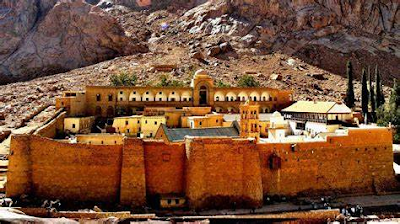 St. Catherine's Monastery, Sinai
St. Catherine's Monastery, SinaiA friend—two friends, actually—have recently casually condemned the monastic life: “Faith without works is dead. Self-awareness without action is….? a retreat to the monastery.” And: “At this point in time [nothing] is worse than a retreat to a monastery - it is an abdication of responsibility as an enlightened human to help Earth and to be an active part of Earth.”
This especially perturbs me, as I believe monasteries are of great value, and the solution to many of our urgent problems.
When one retires to a monastery, one is of course not withdrawing from Earth. One is withdrawing specifically from the social life. One is withdrawing from at least one, presumably three, of the great temptations: “the world, the flesh, and the devil.” We are told to be “in the world, but not of it.” That’s what the monastery offers.
Recall too the example of Martha and Mary: in calmly worshipping rather than puttering about, Mary had chosen the better part. “The wicked will not rest.”
Nor is one withdrawing from good works by withdrawing from social life. Monasteries perform many good works.
The greatest value of the monastery, and the reason we have urgent need for them, is as a refuge for the persecuted. Many families are dysfunctional. This is, I submit, on the evidence, the cause of most if not all of what we call mental illness. At least, more broadly, bad life situations, bad social situations, are the cause of “mental illness.” Unfortunately, especially for the young, we have nowhere to go—to escape, to get a little quiet, a chance to get away from the incessant noise and sort things through. Mental hospitals failed at this—and in any case, have all been closed down. As have the orphanages.
As a result, many lives are lost, many live in unending torture, many are unproductive who might have given much. Many explode, lash out, and cause further harm to themselves and others in chain reactions unto the fourth genertion.
In earlier times, there was a safety valve. “Get thee to a nunnery.” It was so obviously valuable that it emerged independently in most societies: in the Buddhist East, in Sufism, in the Hindu ashram, as well as in Christianity East and West. We need that desperately. Society needs that desperately.
We need it for social justice.
Justice means everyone gets their just desserts, what they merit: meritocracy. “Social justice,” a Catholic concept, amends this by pointing out that all humans deserve respect and a decent life, even if they are not contributing to society.
Monasteries provide this element: the poor can always find a home and respect in a monastery. Monasteries have automatically taken in the disabled, infirm, orphaned children, or the congenitally incapable; and given them a purpose and a community. Monasteries were the first hospitals. They are also the only successful “communist” or “socialist” societies.
Monasteries are also centres of learning. The life of the mind is not just a good work; it is an exponentially better work than merely feeding the poor at your door, or in your neighbourhood—which they also do--on the old but true saw that, if you give a man a fish, he eats for a day; but if you teach him to fish, he never goes hungry. They teach and preach, give meaning, and they preserved civilization itself through the dark ages when the Roman Empire collapsed. They are the one place where an artist can make a living at his or her art. They are responsible for many scientific discoveries and civilizational advances. They were the original libraries, and the original universities.
In this, as a centre of learning and study, the monastery is still a better option than the university. The modern university is plagued with politics and careerism. The university has gone astray without its religious mission. The monastery preserves the necessary detachment and objectivity, and the absence of the profit motive.
And the downside is—what? As an individual, if the monastery turns out to be abusive or unpleasant—you just pack up and leave. This is why, uniquely, they work as communist societies. Because they are purely voluntary.
Monasteries have shown that they can be self-sustaining. They don’t have to take tax money. They don’t cost the government anything. In fact, their great financial success is why they are now rare. Governments worried about their growing power, and coveted their assets. The same problem encountered by the Knights Templar, and the Jews: the dangers of success.
How can we revive them?
'Od's Blog: Catholic comments on the passing parade.
May 7, 2025
That Woman in Minnesota
A woman was lately videoed admitting she called a child “the n-word” at a Minesota playground. For what it is worth, she claims it was because she caught him rifling through her child’s diaper bag. She was doxxed online. The local police opened an investigation. The NAACP opened a GoFundMe and raised $340,000 for the black child and his family.
Rather than apologize, the woman opened a GiveSendGo and appealed for donations to help her and her family relocate to safety. She has raised, at this report, $750,000.
The situation is insane, and a measure of how bad racial tensions have become in the US. Let’s try to restore some perspective.
“The n-word” is not inherently an insult. It is an insult only because we have arbitrarily decided so. It simply means the colour “black” in French or Spanish, a bit distorted by an English tongue. If it is an insult, this implies that there is something gravely wrong with having dark skin. Do we want to concede this?
Further, those of African ancestry commonly use “the n-word” among themselves, to refer to themselves. To say that a given act is fine for one racial group, but wrong for another, is an obvious example of racial discrimination. This should not be acceptable.
It is also now wrong to refer to East Asians as “yellow,” or to Native Americans as ‘redskins”—if apparently much less so—but there is nothing wrong with referring to anyone with fair skin as “white.” This again is obviously discriminatory. If it is wrong to refer to someone by their skin colour, it is wrong for everyone, or you are a racist.
Finally, free speech is free speech. Even granted that this was legitimately an insult—surely in this case an insult was intended—anything more than a verbal punishment, as was administered immediately on site without video being required—is clearly disproportionate.
All the tumult is madness. But at least let’s hope that the fact that the woman actually seems to have profited in the end for her small transgression, rather than having her life ruined, as intended, may go some distance in restoring balance.
'Od's Blog: Catholic comments on the passing parade.
May 6, 2025
Pope Donald I
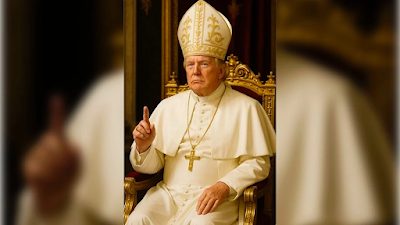
Apparently, as a Catholic, I am supposed to be offended by Donald Trump’s retweet of an image of himself as Pope. Cardinal Dolan, the Vatican, and the US Conference of Catholic Bishops have all objected. A left-wing friend was eager to hear my condemnation, expecting this would be the final straw to turn me against Trump.
Nope. I find it only mildly amusing.
Something I have always admired in Buddhism, and in Judaism, and wished I saw more of in Catholicism, is a sense of humour and a tendency to joke about religious matters. I love St. Theresa of Avila, because she did joke. For God is in laughter. Laughter is a proper response to revelation.
It is easy to make an idol out of the Pope. He is our father, in the spiritual sense, and it is no more proper to idolize him than it is to idolize our biological father. “Call no man father but your father who is in heaven.” He is a man, not God, and may be as flawed as the next man. We owe him respect, for his office, but not reverence. That is for God.
Trump’s meme is apt, and funny, because it reveals this deep truth.
Which is akin to this Buddhist truth: “If you see the Buddha in the road, kill him.”
Which, I hasten to dd for those who lack all sense of humour, is not to advocating killing the pope, or anyone else in any literal sense.
'Od's Blog: Catholic comments on the passing parade.
May 4, 2025
So Long, Canada
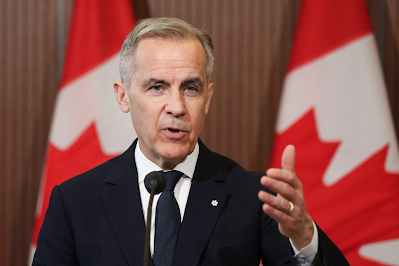
My God, my God, why have you forsaken us?
I am not over the trauma of the Canadian election. The result was, on its face, the worst possible. Four more years of the Liberals with their growing totalitarianism, growing censorship, growing immigration, deliberate hobbling of the economy, growing taxes and deficits, supply management and trade war.
Worse, with a minority. This means they do not have a mandate to negotiate with Trump. There is no unified front. Sooner than expected, but just as I expected, Alberta is talking of secession.
Has God abandoned Canada?
He might have reason to love America more. America has after all been at the forefront of advancing human rights and human liberty. And it has assumed the task of defending it. What, by contrast, does Canada’s existence do for the world, for mankind, for human progress, by existing apart?
America is also at the forefront of reverence for God, of religious faith. Granted that there is much religious fervour in poorer nations, America stands without parallel as a rich and successful nation that nevertheless has preserved its faith. It shows the path forward, then. Within the Catholic Church, America is now seen as the home of the resistance to modernism. And reports are growing of a general revival, a new Great Awakening.
At the same time, Canada has been blindly arrogant. On the one hand, we have looked down on Americans, imagined we are superior. We have not been grateful for their decency and generosity as a neighbour. Instead, we show contempt. “We burned down your White House.” Which, of course, we did not. “We won the War of 1812.” Which we did not. We object to their new tariffs, and ignore our tariffs on US products, as though America owes us something.
On the other hand, we in Eastern Canada, the bulk of the population, have arrogantly ignored the concerns of Alberta and the West. We have looked down on them. We have expected them to send us regular tribute, and expressed no gratitude for it. We have treated them like a colony.
We have deserved some chastisement.
But have we been so awful that we deserve to be destroyed? Surely we have still been on the whole a moral people, better than most.
Yet God perhaps knows best. Carney promises the destruction of Canada. Poilievre promised a chance to hold the enterprise together.
Maybe it is best for all if Canada dies fast so that the suffering is not drawn out. The great apocalypse everyone fears is simply Canada being assimilated into the United States—a fate that most people in the world would consider the best thing that could happen to them.
Canadians can then expect greater wealth, lower taxes, more career opportunities, stronger guarantees for our freedoms, more security, more life choices.
Will we feel nostalgia for the old Canada? There is no real reason to, as we can and no doubt will preserve our traditions. Just as Texas remains distinct within the US, or Louisiana, or New England.
'Od's Blog: Catholic comments on the passing parade.
May 2, 2025
The Dispossessed of Gaza--and Canada
 Mahmoud Darwish
Mahmoud DarwishIn a poetry group, as a prompt, one member quoted a poem by Palestinian poet Mahmoud Darwish, which ends:
You stole my forefathers' vineyardsAnd land I used to till,
I and all my children,
And you left us and all my grandchildren
Nothing but these rocks.
Will your government be taking them too
As is being said?
So!
Put it on record at the top of page one:
I don't hate people,
I trespass on no one's property.
And yet, if I were to become hungry
I shall eat the flesh of my usurper.
Beware, beware of my hunger
And of my anger!
To which I responded, before submitting a poem:
Being dispossessed of one’s livelihood and land is a rather common human experience. It is especially common among those who have populated Canada. We are, in Cohen’s phrase, “Beautiful Losers.” The Acadians were expelled from their lands in Tantramar, in Nova Scotia and New Brunswick. The Huron were expelled from their lands by the Iroquois, and found refuge in Quebec. Then the Iroquois were expelled from their lands by the Americans, and sought refuge in Ontario. The UE Loyalists were expelled from their lands and possessions in the 13 colonies, and landed mostly penniless and without shelter in New Brunswick, Nova Scotia, Ontario, and Quebec. The Irish, my own ancestors, were expelled from their lands: “to Hell or Connaught!” Many did not survive the passage; many died on the docks. The Scots were expelled from their lands in the Highland Clearances, so that today there is more Scots Gaelic spoken in Cape Breton than in Scotland. The many Jews came here from Eastern Europe to escape pogrom; they risked loss of life as well as property. After the Second World War, there was a great influx to Canada of what were then called “displaced persons” from the shifting boundaries and regimes from that war.
Many of us have, at some time in our lives, lost everything. Many of us can thank God there is a new life here in Canada. This was a common vision of our founders: of Louis Riel, of Wilfrid Laurier, of John A. Macdonald, of Guy Carleton. “A home for all the world’s peoples.” A home for the homeless—for, notably, English orphans, the “home children.”
The sine qua non was to be prepared to start again. Gregory Clark suggested there should be a monument erected on Grosse Ile, outside Quebec City, with the legend “Leave all your hates behind. Bring us only your loves.”
This was of course a dig at the Palestinians. Their grievance is the creation of the state of Israel. That happened in 1948: 77 years ago. Longer than a human lifetime, in that part of the world. Few living Palestinians have been dispossessed; yet as a group they have not moved on. Surely by now they bear some responsibility for their state?
This is not to address the Israeli claim that no Arabs were actually dispossessed by the creation of Israel; that it was their choice to leave. Twenty percent of the Israeli population is still Arab.
The guy who posted the original poem did not take this disagreement well. He declared me a racist and an imperialist because, in my list of the dispossessed in Canada, I did not mention the Canadian indigenous people dispossessed by settlers.
Which is ironic. The indigenous people are arguably the only group in Canada who have not been dispossessed of their land or forced to move. That is what “indigenous” means.
Were their lands stolen? What lands? 89% of Canada is still crown land. By treaty they are free to roam and hunt and scavenge all over it, just as their ancestors always did.
As for the other eleven percent, they sold it and were compensated for it. It was not seized.
But the poet of the Palestinian prompt did not wait around to hear this. He had already quit the group, because in conscience he could not be in the same poetry group with a racist.
'Od's Blog: Catholic comments on the passing parade.
April 29, 2025
On the Canadian Election Results

It is typical that the media are playing the just-finished Canadian election as a striking defeat and rebuff for Poilievre and the Conservatives. Warren Kinsella has a column out urging the Tories to get a new leader. Poilievre has failed.
Never take advice from your enemies.
It is sad that the Conservatives did not achieve power. It is sadder that Poilievre lost his own seat. But actually, the Conservative vote was at a near-all-time high. They missed the brass ring only because of the collapse of the NDP.
Carney could have an awkward time of it. The NDP ought to take the lesson that they lose by propping up the Liberals: doing so last time cut them down to below party status. To have any chance at a future, they must now distinguish themselves sharpy from the Liberals.
At the same time, the Liberals will likely pay a price in the rest of Canada for making any deals with the BQ, an avowedly separatist party. And there is nothing in such cooperation for the Bloc either. The Liberals are their main opponents in Quebec. Strategically, they hardly want to make the Rouge look good by forcing them into new programs popular in Quebec. The credit in the popular mind is liable to go to Carney, not Blanchet and the Bloc.
So I see a good chance that Carney will soon be unable to command the support of the House. Meantime, the Liberals’ environment policies seem bound to alienate Aberta into at least talk of separation. And some economist has argued that whoever wins this time is unlucky, because the tariffs and trade war are going to lead to hard times soon. They will be blamed. Or they are going to have to cut a deal with Trump, and they will be tarred with inconsistency if not duplicity.
There will be good incentive soon enough among the other parties to bring down the government, and not be seen to prop them up. This may only be the first round.
'Od's Blog: Catholic comments on the passing parade.
April 26, 2025
Canadian Leaders and the Oncoming Election
R
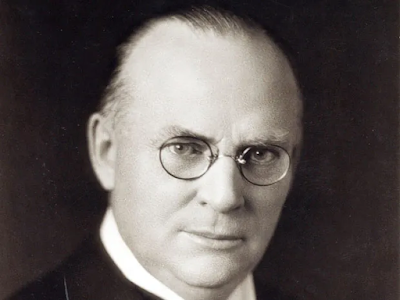 RB Bennett: the risks of winning the wrong election.
RB Bennett: the risks of winning the wrong election.The talking heads at CBC’s At Issue think Pierre Poilievre, Yves-Francois Blanchet, and Jagmeet Singh all face likely loss of their party leadership after Monday’s election.
I believe only Singh is in trouble. Singh’s caucus will probably be cut in half; Singh will lose his own seat; and it will be his own fault—for backing the unpopular Liberals until they themselves pulled the plug. According to the polls, by stalling, he lost a chance for the NDP to form the Official Opposition. The latest polling has them down to eight seats, losing party status. He should have known, historically, that third parties are always punished for entering a coalition. And such a coalition, with an already unpopular prime minister! He really seems to have intentionally destroyed the NDP.
But Blanchet will surely not be blamed if the BQ loses seats. He is brilliant; the BQ cannot do better. It is circumstances--the tariff scare, and the fear of Canada breaking up--that have caused Quebec voters to rally, temporarily, around the Canadian flag and the obvious federalist alternative in Quebec, the Rouge. I expect BQ regulars to understand that, and see Blanchet as their best option going forward.
And about the same is true of Poilievre. He has run a flawless campaign; he is a brilliant rhetorician, a brilliant tactician. He was poised, six months ago, to crush the Liberals. That big win slipped away due to circumstances beyond his control: Trudeau’s resignation, Trump’s tariffs, Carney’s coronation and adoption of key elements of the Conservative platform. These show, if anything, just how effective a politician he has been. He forced his opponent to resign. He managed to kill the carbon tax, without even being in power. Nobody else in the Tory party is likely to do better. And, if in opposition, nobody else in the Tory party is likely to be a more effective opposition leader.
True, the Tories have dumped their last two leaders after only one election loss. But neither Scheer nor O’Toole had Poilievre’s legitimacy.
Scheer’s leadership was tainted by scandal. First, he snuck past Bernier, the front runner in his leadership bid, by making a backroom deal with the dairy lobby. That left a lot of bad feeling in the party. Second, since he won in this way, he did not have a strong personal following; he was second choice for most who supported him. Third, he had falsified his job history and concealed his dual citizenship. Fourth, he lost his ideological cred by waffling on the abortion question. It is not that he was either pro or con: it was that he seemed to change his position for the sake of power. So he did not come across as a man of principle.
O’Toole ran for and won the leadership as a “True Blue” Tory; then campaigned in the election as “Liberal lite.” There is a saying in politics: if you abandon your principles for power, you’d better deliver power. Otherwise, you’ll have no nothing to fall back on. Ask Tom Mulcair.
But Poilievre, like Harper, has ideological cred to sustain him through a season of want. He inspires loyalty; he won the Tory leadership by a wide margin on the first ballot.
I have no special insights, and therefore no ability to predict the outcome of the election. I can only look at the polls. As of this morning, 338 Canada predicts a Liberal majority government at 186 seats. With the NDP at just 8 seats.
But there is a trend towards the Conservatives in recent days. So I’m hoping for a Liberal minority. Then perhaps, we may get a chance to remove them in a year or two.
I expect the Liberals’ policy of fighting a trade war with the US will prove disastrous. Their “green” agenda will provoke a national unity crisis. Even without this, one pundit says whoever wins this current election is likely to rue the day, since bad times are coming, and they will be blamed.
The Lord works in mysterious ways.
Let’s hope he still likes Canada, despite our arrogance.
'Od's Blog: Catholic comments on the passing parade.
April 25, 2025
Is Pope Francis Really Dead? Is Anyone?
It seems to me there is no valid distinction between mindand soul. These are both terms for the perceiving consciousness plus the will.People tend to use “soul” if they are arguing that the mind is immortal.
I hold to this, firstly, by Occam’s Razor: there is no reasonto multiply entities. Secondly, if the soul is not the perceiving consciousness,the “I,” it does not matter whether it is immortal. And if it is to be judgedbased on our acts of will, as all major religions affirm, it must include thewill.
Now, does the perceiving consciousness survive the death ofthe body? Is it dependent on the physical brain?
Friend Xerxes write, “no one has ever come back from theother side to tell us what goes on there.”
This is not obviously true. As Xerxes himself notes, peoplehave indeed revived after being declared dead; and they have reported experiencesof the hereafter.
Granted, we call them “near-death experiences” rather than “after-lifeexperiences.”
But there is a tautology here: “brain death” is actuallydefined as an “irreversible” loss of brain function. In other words, if anyonecomes back from death, they were by definition not dead.
Are their experiences legitimate evidence for an afterlife?
Xerxes laments, “there is no way of testing the validity oftheir memories.”
But there is. Those returning to life have reported hearing andseeing things during the period when they were supposedly dead; and their accountsare confirmed by others present. So the consciousness survives the absence ofall activity in the brain, at a minimum. And the claims of out of bodyexperiences have also been confirmed: they were able to accurately reportthings they could not have seen from their body. So the consciousness is nottied to the body.
We cannot similarly independently confirm their reports of aworld apart from the physical world, to which they journey. But we can confirmit by the fact that those experiences tend broadly to tally among differentreports. As Xerxes notes: “Often they report seeing bright lights, moving downsome kind of tunnel, being welcomed into a new world of peace and calm.”
It is on the same basis that most of us confirmed theexistence and nature of Timbuctu, in the days before Google maps. The fact thatthose who had not actually been there cannot verify reports is immaterial.
Then there is the witness of Jesus. Xerxes laments that,having been resurrected, he said “not one word about the far side of death.”
He actually said a lot. This was all that “kingdom of heaven”stuff. He said after death would come a judgment, and that the good and justwould enter paradise, while the evil and iniquitous would enter eternal flames.And that there was no passage between the two. More detail is given, albeit notby Jesus in the flesh, in the Book of Revelations and elsewhere in the Bible.
I imagine Xerxes means Jesus did not say any of this this afterthe resurrection. But, having already said it, what would have been the reasonto repeat it now, or for the gospels to record it? Only if, based on his morerecent experiences in the underworld, harrowing hell, his understanding hadsomehow changed. Presupposing, as well, that he was not omniscient, was not God,so that he could have misunderstood previously.
And then, as Xerxes reports from his own experience, thereis the evidence of “ghosts.” People actually seem able to communicate with us, everynow and then, after physical death. While I have not personally had such unambiguousexperiences, many others have, including Xerxes, who has distinctly heard hisdeceased wife speak to him in the night, or felt her presence as she rose fromthe bed to use the facilities. Such stories are common.
There are other sources of evidence. While anything physicalis transitory, appears and disappears, anything mental or spiritual isimmortal, endures. The cat runs into the bushes and disappears. Yet the memoryof the cat running into the bushes remains in my mind’s eye indefinitely; if itfades, it can be reinvoked. The mental cat is immortal.
You will say memories fade. But they do not die. We may havegreater or lesser difficulty summoning them to consciousness, as time wears on,but they are there forever somewhere, and can resurface. A certain smell, acertain song, the taste of a madeleine…
Try that with the actual cat Sniffles you had as a child.
So it is of the essential nature of the mind to be immortal.
This is not yet to get into the medical reports of thosewith virtually no physical brain sometimes nevertheless demonstrating normalintelligence. This is not to get into the reported miracles of the saints orIndian yogis, like levitation, bilocation, praeternatural knowledge, and soforth; which broadly suggest mind can exist and act without dependence on thephysical body. Given, of course, that such reports can be false.
The rational conclusion, therefore, based on the evidence,is that the mind or soul is immortal; that there is life beyond the life in thebody. It is merely a materialistic prejudice to balk at the idea.
William Blake, or Bishop Berkeley, or Plato, would argue thatthe body and the physical world are the epiphenomenon. Only the mind is real. Blakewrote “the body is that portion of the soul visible to the five senses.”
Berkeley has never been disproven on this. People just don’twant to hear it.
'Od's Blog: Catholic comments on the passing parade.



